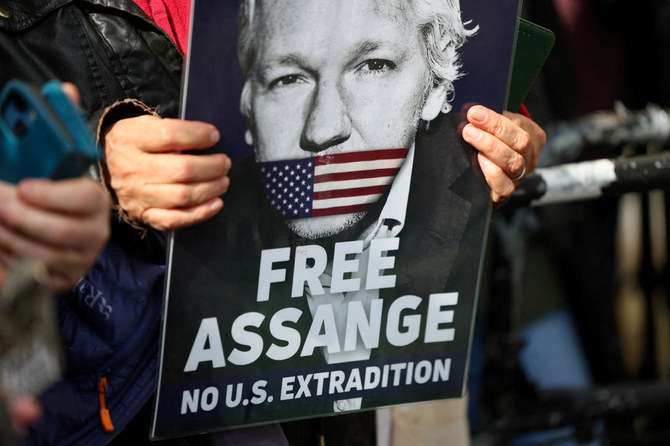LONDON: The United States has provided assurances requested by the High Court in London which could finally pave the way for WikiLeaks founder Julian Assange to be extradited from Britain.
Last month, the High Court ruled that, without certain US guarantees, Assange, 52, would be allowed to launch a new appeal against being extradited to face 18 charges, all bar one under the Espionage Act, over WikiLeaks’ release of confidential US military records and diplomatic cables.
Those assurances — that in a US trial he could seek a First Amendment right to free speech and that there was no prospect of new charges which could see the death penalty being imposed — have now been submitted by a deadline which fell on Tuesday.
The document, seen by Reuters, states that Assange “will have the ability to raise and seek to rely upon at trial the rights and protections given under the First Amendment of the Constitution of the United States.” However it adds that a decision on the “applicability of the First Amendment is exclusively within the purview of the US courts.”
The document also says that a sentence of death will neither be sought nor imposed.
“These assurances are binding on any and all present or subsequent individuals to whom authority has been delegated to decide the matters,” it said.
There will now be a further court hearing in London on May 20, but his lawyers have previously described US assurances given in other cases as not “worth the paper they’re written on,” echoing similar criticism from human rights group Amnesty International.
’EXTREME DISTRESS’
Assange’s wife Stella, whom he married while in prison in London, said the guarantees did not satisfy their concerns, describing them as “blatant weasel words.”
“The United States has issued a non-assurance in relation to the First Amendment, and a standard assurance in relation to the death penalty,” she said in a statement.
“The diplomatic note does nothing to relieve our family’s extreme distress about his future — his grim expectation of spending the rest of his life in isolation in US prison for publishing award-winning journalism.”
There was no immediate comment from the US Department of Justice or a High Court spokesperson.
Last week, US President Joe Biden said he was considering a request from Australia to drop the prosecution, which Assange’s US lawyer described as “encouraging.”
It was not clear what influence, if any, Biden could exert on a criminal case, but the Wall Street Journal has also reported that discussions are underway about a potential plea bargaining deal.
Assange, who is an Australian citizen, has spent more than 13 years in various legal battles in the English courts since he was first arrested in November 2010.
To his many supporters, he is an anti-establishment hero who is being persecuted for exposing US wrongdoing and details of alleged war crimes in secret, classified files.
The US authorities argue he is not being prosecuted for the publication of the leaked materials, but for the criminal act of conspiring with former US Army intelligence analyst Chelsea Manning to unlawfully obtain them.
“The Biden administration must drop this dangerous prosecution before it is too late,” Stella Assange said.


























